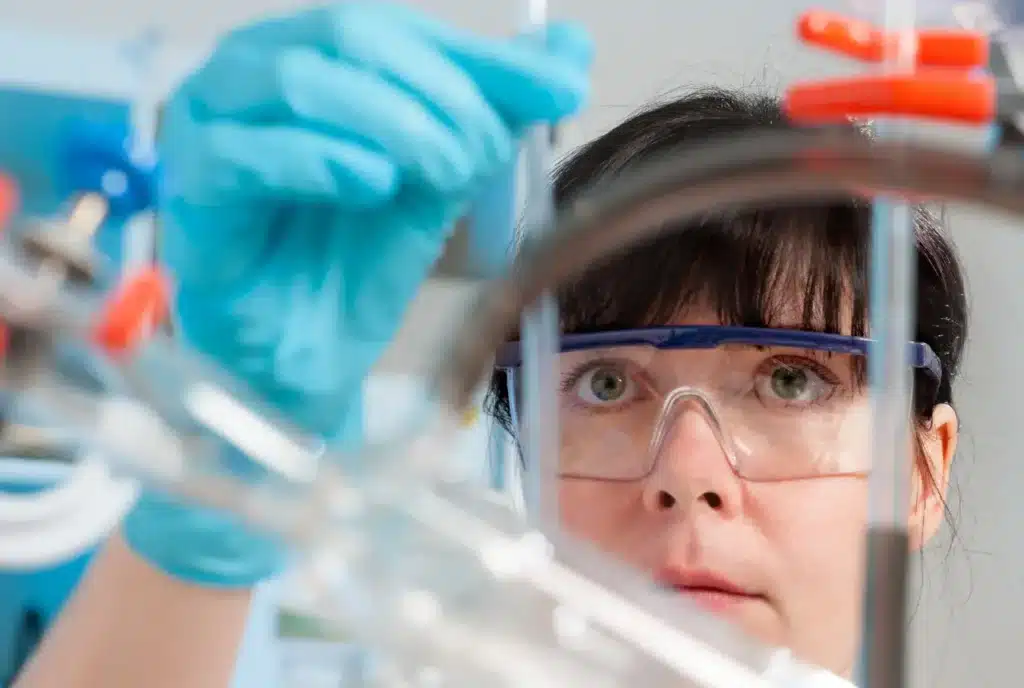NEET chemistry important topics are necessary to discuss. The National Eligibility cum Entrance Test (NEET) serves as the sole gateway for aspiring medical students in India to pursue MBBS degrees in government and private medical colleges. This single standardized exam ensures fairness and transparency in the admission process, allowing students to compete nationally based on their NEET score.
Chemistry holds significant importance in NEET, with a weightage of around 50% of the entire exam. This emphasizes the crucial role mastering Chemistry plays in securing a good medical college seat.
This blog post aims to guide you, the future doctor, by identifying the most essential Chemistry topics for the NEET exam. By focusing your efforts strategically, you can maximize your score and increase your chances of achieving your medical dream.
Demystifying NEET Chemistry: Understanding the Syllabus and Weightage

The NEET Chemistry important topics section tests your understanding with 45 questions within 180 minutes. Each question carries 4 marks, making this section crucial for a competitive score.
The weightage is fairly distributed across the three branches of Chemistry: Physical, Organic, and Inorganic. Each branch contributes around 15 questions, indicating their equal importance.
As of January 2024, there have been no significant changes reported in the NEET Chemistry syllabus or weightage compared to previous years. This allows you to rely on past trends and established resources for your preparation.
Remember, thorough understanding and practice combined with effective time management are key to conquering the NEET Chemistry section.
Here are some of the Important Topics for NEET Chemistry

Physical Chemistry
Physical Chemistry forms the foundation for understanding chemical reactions and their interactions with matter and energy. This crucial section of the NEET exam covers several key topics (each worth approximately 2-3 questions):
- Chemical Bonding and Molecular Structure: This delves into how atoms interact to form molecules, explaining various bonding theories and their impact on molecular shape and properties.
- Equilibrium: This explores the dynamic nature of chemical reactions, focusing on factors that influence the state of equilibrium and its applications.
- States of Matter (Gases and Liquids): This emphasizes the properties and behavior of gases and liquids under different conditions, including the ideal gas law and intermolecular forces.
- Solutions and Colligative Properties: This focuses on the formation and properties of solutions, explaining how the presence of solutes affects various colligative properties like colligative boiling point elevation.
- Electrochemistry: This unveils the fascinating world of electrochemical reactions involving electron transfer, including topics like redox reactions, electrochemical cells, and the Nernst equation.
- Chemical Kinetics: This section explores the rate and mechanism of chemical reactions, analyzing factors that influence reaction rates and predicting reaction progress.
- Thermodynamics: This branch deals with the relationship between heat, work, and energy transfer in chemical processes, focusing on concepts like entropy, enthalpy, and free energy.
By mastering these core topics and their applications, you can develop a strong foundation for tackling the Physical Chemistry section of the NEET exam effectively.
Organic Chemistry
Organic Chemistry, the “chemistry of life,” delves into the fascinating world of carbon-based compounds and their properties. This section carries significant weightage in NEET, and understanding these key topics (each worth approximately 2-3 questions) is crucial for success:
- Some Basic Principles and Techniques: This lays the groundwork with fundamental concepts like nomenclature, isomerism, reaction mechanisms, and organic preparations.
- Hydrocarbons: This explores the properties and reactions of alkanes, alkenes, and alkynes, forming the backbone of many organic molecules.
- Aldehydes, Ketones, and Carboxylic Acids: These functional groups play vital roles in various biological processes, and understanding their reactions is essential.
- Haloalkanes and Haloarenes: This explores the properties and reactions of organic compounds containing halogen atoms, focusing on their applications and environmental concerns.
- Alcohols, Phenols, and Ethers: These functional groups have diverse applications in various fields, and their reactions form an important part of the NEET syllabus.
- Amines: Understanding the structure, properties, and reactions of amines, another crucial functional group, is key for mastering organic chemistry.
- Biomolecules: This section dives into the essential molecules that govern life processes, including carbohydrates, proteins, lipids, and nucleic acids.
- Polymers: This explores the structure, properties, and applications of polymers, the building blocks of various materials.
By gaining a thorough understanding of these topics and their interrelationships, you can effectively navigate the challenges of the NEET Organic Chemistry section and achieve your desired score.
Inorganic Chemistry

Inorganic Chemistry explores the properties, structures, and reactions of elements and their compounds, excluding the vast realm of organic compounds. This section holds significant weightage in NEET, and focusing on these key topics (each worth approximately 2-3 questions) is recommended:
- Periodic Classification of Elements: Understanding the periodic table, its organization, and periodic trends is fundamental for comprehending the behavior of elements.
- Coordination Compounds: These fascinating molecules involve central metal atoms surrounded by ligands, and their structure, bonding, nomenclature, and isomerism are crucial for NEET.
- p-Block Elements (including Group 14, 15, 16, and 17 elements): This group encompasses elements like Carbon, Nitrogen, Oxygen, and Halogens, forming the building blocks of many important compounds. Their properties, reactions, and trends across the group are vital for the exam.
- d- and f-Block Elements: While not as extensively tested, understanding the electronic configuration, general characteristics, and trends of these transition and inner-transition elements is necessary.
- Metallurgy: This branch deals with the extraction, purification, and properties of metals, and basic knowledge of extraction processes and properties of common metals is important.
Note: The General Principles of Qualitative Analysis, which involved traditional methods for chemical identification of elements, has been removed from the NEET syllabus since 2019.
By diligently studying these core concepts and their applications, you can develop a strong foundation for tackling the Inorganic Chemistry section of the NEET exam with confidence.
Beyond the Syllabus: Tips for Smarter Preparation
Remember, conquering the NEET Chemistry section goes beyond simply memorizing facts. Here are some crucial tips for smarter preparation:
- Focus on understanding concepts: Rote learning might offer short-term benefits, but true mastery lies in grasping the underlying principles of chemical phenomena. This allows you to approach questions with flexibility and problem-solving skills.
- Utilise NCERT textbooks and reference materials effectively: The NCERT textbooks serve as the foundation for your preparation. Master them thoroughly before exploring additional reference materials like coaching modules or topic-specific books that can enhance your understanding and offer diverse practice problems.
- Practice with previous year’s question papers and mock tests: Familiarise yourself with the format and difficulty level of NEET questions by practicing with previous year’s papers and mock tests. This not only identifies your strengths and weaknesses but also helps you develop test-taking strategies and time-management skills.
- Maintain a consistent study schedule and time management: Regular and focused study sessions are crucial for effective preparation. Create a realistic schedule that allocates sufficient time for each topic and stick to it diligently. Time management is equally important, learn to pace yourself during practice tests and develop strategies to maximize your score within the allotted time.
- Address weaknesses and seek help when needed: Don’t shy away from your weak areas. Identify them through practice and dedicate extra time to understanding those concepts. Don’t hesitate to seek help from teachers, mentors, or online resources to clarify doubts and overcome challenges.
By following these tips and adopting a strategic approach to your NEET Chemistry preparation, you can confidently step into the exam and achieve your desired score.
Conclusion: A Road Map to Success
The NEET Chemistry section presents a significant hurdle on your journey towards becoming a doctor. However, armed with a strategic approach and by focusing your efforts on the high-yield topics outlined in this guide, you can conquer this challenge. Remember, understanding concepts is key, and effective utilization of resources, consistent practice, and addressing weaknesses are crucial for success. Take control of your preparation, embrace the challenge, and pave your path to achieving your medical dream.












